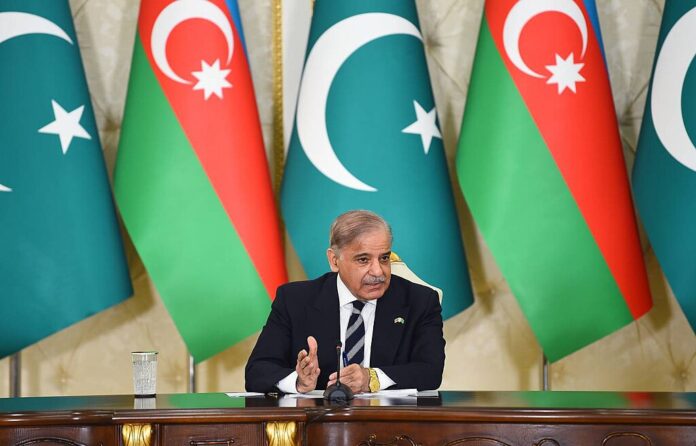With polio cases increasing to 17 this year, Pakistan initiates a major vaccination campaign targeting 30 million children under five from September 9 to 15
On September 8, 2024, Prime Minister Shehbaz Sharif inaugurated a nationwide anti-polio campaign in Islamabad, aiming to eliminate the debilitating disease from Pakistan. This special drive comes in response to a troubling rise in polio cases, which have surged to 17 in 2024.
The ambitious campaign, spanning from September 9 to 15, will cover 115 districts across Pakistan. It targets immunizing 30 million children under the age of five, a critical age for polio vaccination. To achieve this, approximately 286,000 polio workers will conduct door-to-door visits, ensuring that every eligible child receives the oral polio vaccine.
Embed from Getty ImagesAt the launch ceremony, PM Shehbaz Sharif personally administered polio drops to children, underscoring his commitment to the campaign. “We are grateful to the partners and friendly international organizations cooperating with the government in the fight against polio,” said Sharif. He expressed confidence that the combined efforts of the federal and provincial governments, along with international partners, will result in the complete eradication of polio from Pakistan. “Our efforts to eliminate polio from Pakistan will certainly bear fruit, Insha’Allah,” he added.
The ceremony was attended by notable figures, including the PM’s Coordinator for Health, Dr. Mukhtar Bharath, and the PM’s Special Representative for Polio Eradication, Ayesha Raza Farooq. Representatives from the World Health Organisation (WHO), UNICEF, the Gates Foundation, and the United Nations were also present, reflecting the global support for Pakistan’s anti-polio efforts.
The recent uptick in polio cases has heightened the urgency of this campaign. Islamabad reported its first case of polio in 16 years just two days prior to the launch, contributing to the national tally of 17 cases for the year. Polio, a highly infectious disease primarily affecting children under five, can lead to paralysis or death. The virus mainly targets children who are malnourished or inadequately vaccinated.
Despite significant progress over the years, Pakistan remains one of the two countries worldwide, along with Afghanistan, where polio is still endemic. The disease’s persistence highlights the ongoing challenges in achieving complete eradication, despite rigorous vaccination efforts.
The drive’s success hinges on the collaboration of local and international stakeholders and the active participation of parents. PM Sharif urged parents to ensure their children receive the vaccine, emphasizing that vaccination is the most effective protection against polio’s severe consequences.
Analysis:
Political Perspective: The nationwide anti-polio drive led by PM Shehbaz Sharif reflects the government’s commitment to addressing a critical public health issue. The timing of the campaign, following a rise in polio cases, demonstrates a proactive approach to public health crises. The campaign’s success could enhance the government’s reputation and showcase its ability to tackle significant challenges. However, the drive also underscores the political implications of public health issues, as the handling of such crises can influence public perception and political stability.
Social Perspective: The anti-polio campaign is a crucial public health initiative that highlights the social responsibility of both the government and individuals. The campaign aims to protect children from a debilitating disease and ensure their well-being. By emphasizing the importance of vaccination, the campaign seeks to foster a culture of preventive healthcare. The involvement of international organizations and local communities further underscores the collective effort required to address public health challenges and the social impact of vaccination programs.
Racial Perspective: Although the campaign does not explicitly focus on racial issues, it has implications for marginalized communities. Polio often affects children from under-resourced backgrounds who may lack access to healthcare. The campaign’s extensive reach aims to address disparities in vaccination coverage and ensure that all children, regardless of their socio-economic status, receive protection against polio. This effort reflects a broader commitment to equity in healthcare.
Gender Perspective: The campaign’s messaging and outreach are inclusive, targeting all children under five years old, irrespective of gender. The involvement of female health workers and community leaders in the vaccination efforts highlights the role of women in public health initiatives. Their participation is crucial for effective outreach and ensuring that the campaign reaches every household, thus reflecting gender inclusivity in public health strategies.
Economic Perspective: The anti-polio campaign has significant economic implications. Polio can impose substantial long-term healthcare costs on families and the healthcare system. By investing in vaccination, the government aims to prevent these future costs and reduce the economic burden of polio-related disabilities. Additionally, successful eradication of polio can boost public health outcomes and improve economic productivity by ensuring a healthier population.
